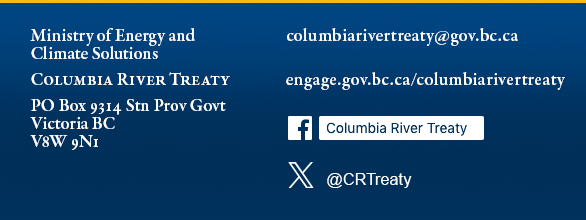Resources
Columbia River Treaty
Edition: May 2019
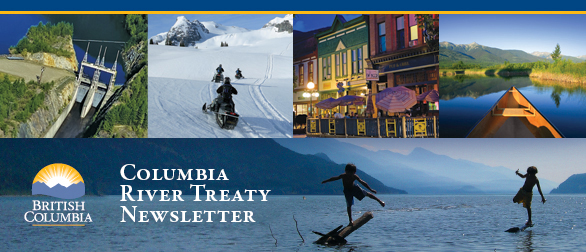
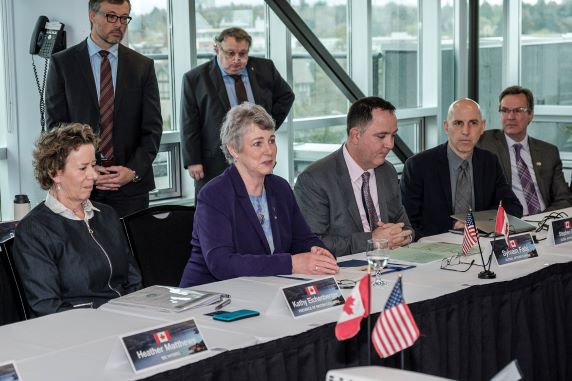
British Columbia Minister Responsible for the Columbia River Treaty, Katrine Conroy, welcomes Columbia River Treaty negotiators in Victoria, B.C. Photo by Don Craig.
Treaty Negotiations Update
On April 10, 2019 Katrine Conroy, British Columbia’s Minister Responsible for the Columbia River Treaty welcomed the negotiating teams representing Canada and the United States to Victoria, B.C., for the latest round of negotiation meetings. The two-day session, which wrapped up on April 11, marked the first time that negotiators have met in British Columbia’s capital city since discussions about modernizing the Treaty began in May 2018.
Over the past year, negotiators have held six sets of meetings, in a variety of Canadian and U.S. locations – in Nelson, B.C., Portland, Oregon, Vancouver, B.C., twice in Washington, D.C., and now in Victoria, B.C.
During the first day of meetings in Victoria, negotiators continued working to find common ground on flood risk management and hydro power co-ordination. To support the progress of these discussions, the teams decided to conduct collaborative technical work on these topics between negotiating rounds.
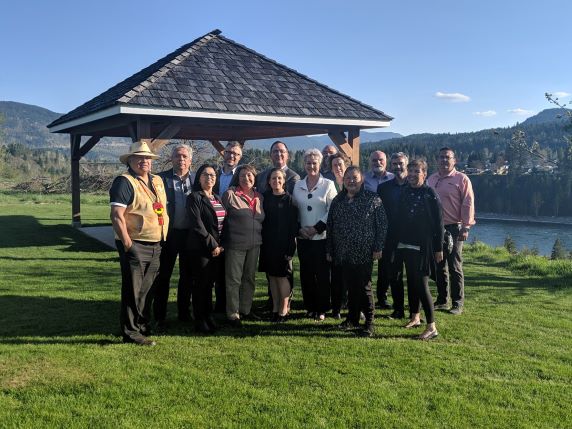
Canada's Minister of Foreign Affairs, Chrystia Freeland, with B.C. Minister Katrine Conroy, representatives of the Ktunaxa, Syilx/Okanagan, and Secwepemc Nations, and members of the Canadian Columbia River Treaty negotiating team in Castlegar, B.C.
Indigenous Nations to Participate as Observers in Negotiations
On April 24, 2019, Canada’s Minister of Foreign Affairs, Chrystia Freeland, visited Castlegar, B.C. to meet with B.C. Minister Katrine Conroy and representatives of the Indigenous Nations of the B.C. Columbia Basin. Minister Freeland came to deliver good news, in a move that she rightly called historic: From now on, representatives of the Ktunaxa, Syilx/Okanagan, and Secwepemc Nations will participate as official observers at the Canada-U.S. Columbia River Treaty negotiations.
Okanagan Nation Alliance Chair, Grand Chief Stewart Phillip, characterized the decision as “courageous but overdue and necessary” while also acknowledging that the federal government’s decision was “bold” and “unprecedented.”
Ktunaxa Nation Council Chair, Kathryn Teneese, noted that the move was “very significant” and part of “small but meaningful steps… on the road to reconciliation.”
Shuswap Nation Tribal Council Tribal Chief, Kukpi7 Wayne Christian, was also pleased by the decision, adding that it “moves us further down the path of reconciliation.”
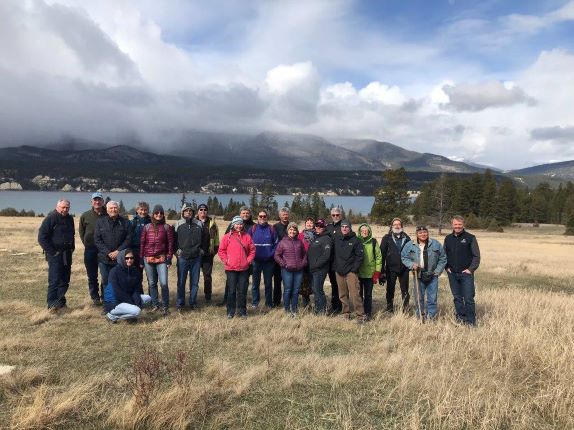
Columbia Basin Regional Advisory Committee at Columbia Lake, B.C.
Columbia Basin Regional Advisory Committee Meets Near the Headwaters of the Columbia River
The Columbia Basin Regional Advisory Committee (CBRAC) gathered for its latest meeting in Invermere, B.C. on April 15 and 16. CBRAC holds its meetings in different locations throughout the Basin, and was pleased to meet, for the first time, near the headwaters of the Columbia River.
Keeping with tradition, CBRAC began the two days by embarking on a field trip, to learn more about the area as related to the Columbia River Treaty and Basin hydroelectric operations. They toured a nearby 315-acre conservation property on the east side of Columbia Lake, known as Lot 48. The property was purchased by the Nature Conservancy of Canada (NCC), with support from the Columbia Basin Trust (CBT) and others, as one element of a broader initiative to conserve ecologically significant lands throughout the Columbia Basin. NCC and CBT representatives led the tour and spoke about the restoration efforts taking place on the property, while representatives of the Akisqnuk First Nation and the Shuswap Band provided information on the historical and cultural significance of this land to Indigenous people.
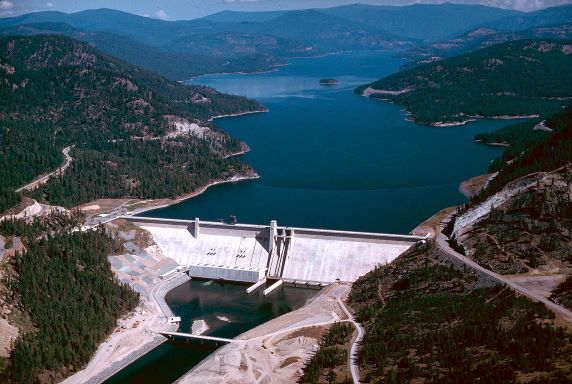
Libby Dam and Lake Koocanusa. (Source: U.S. Geological Survey)
U.S. Perspective on the Columbia River Treaty
Since discussions about the future of the Columbia River Treaty began in 2018, citizen engagement has been an important issue.
This approach is in stark contrast to what happened half a century ago. When the Columbia River Treaty was drafted in the early ‘60s, citizen engagement was not something that governments on either side of the border deemed important.
Today, things are different: over the past year, the U.S. Treaty negotiating team has held a series of Town Hall meetings in the U.S. Basin. These sessions aim to hear Basin residents’ perspectives about the Treaty and keep them informed as negotiations progress.
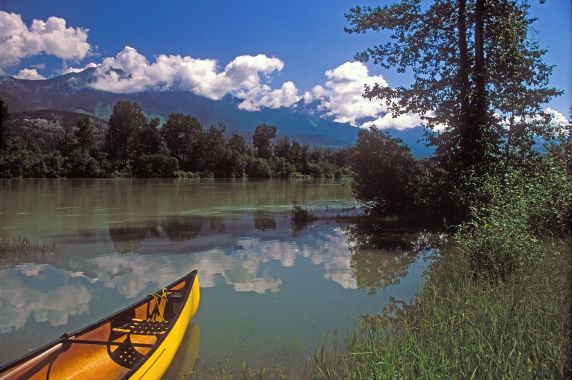
Columbia River, photo courtesy of the Columbia Basin Trust.
Columbia Basin Transboundary Conference - Discuss the Future of the Columbia River
Online registration is open for the Columbia Basin Transboundary Conference: One River, One Future, an international conference addressing key issues related to the future of the Columbia River, its ecosystem, management, and international implications.
Co-hosted by Columbia Basin Trust and Northwest Power and Conservation Council , the conference will take place in Kimberley, B.C., from Sept. 12 to 14, 2019. Register now at www.transboundaryriverconference.org.
“With a conference focus on collaboration, culture, and conversation, attendees will explore a wide range of contemporary topics related to the Columbia River,” said Rick Jensen, Chair, Board of Directors Columbia Basin Trust and conference co-chair. “Our aim is for participants to have discussions and learn from one another and advance our collective approach to being stewards of the river that binds us.”
![[picturealttext]](https://news.gov.bc.ca/Content/Images/clear.gif)
Treaty Fact
What is British Columbia’s role in the Columbia River Treaty?
- Although international treaties are within the jurisdiction of the federal government, the Canada-British Columbia Agreement (1963) transferred most Columbia River Treaty rights and obligations to the Province of British Columbia. The Canada-British Columbia Agreement also requires the agreement of the Province before terminating or amending the Columbia River Treaty.
- Global Affairs Canada is leading the negotiations for Canada, as the federal government has the constitutional responsibility for international treaties.B.C. is part of the Canadian negotiating team.

